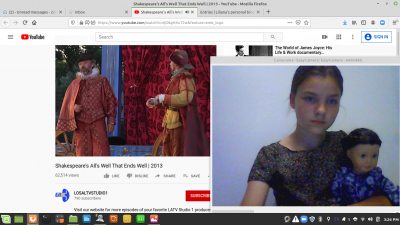As I told you earlier, I had been planning on doing Antony and Cleopatra next. However, I couldn't find a good video to follow along. Too much 'passionate kissing' (it is about an affair, so what did I expect?) and also ten minute clips of productions.
So I went with Julius Caesar, which is my second favourite Shakespeare play.
I found this video... and it was really good. Definitely a tragedy. Like, all the good guys die in the end, usually by suicide or else aided suicide. So yeah. But there's some great speeches in there!
Like Mark Antony's speech "Friends, Romans, country men, lend me your ears" ........ holy cow, what a wowzer. The way he takes a crowd hating Caesar and praising his assassins, to loving Caesar (and, of course, Antony) and going off to murder Caesar's assassins....... just wow.
And holy cow this post is gonna be long...

so grab a few cookies, stretch, and settle down.
Okay, here are some of my favourite quotes from the play:
"Men at some time are masters of their fates: / the fault, dear Brutus, is not in our stars, / but in ourselves, that we are underlings."
"What you have said/ I will consider; what you have to say/ I will with patience hear"
"Awake and see thyself[!]"
"and what other oath / than honesty to honest engaged/ that this shall be, or we will fall for it?"
"Cowards die many times before their deaths;/ the valiant never taste of death but once."
"Not that I loved Caesar less, but that I loved Rome more."
"The evil that men do lives after them"
"A friend should bear his friend's infirmities"
"Good words are better than bad strokes"
"This was a man!"
Okay, now to my thoughts on it:
Brutus did it all wrong.
But still, let us learn from him (wow I'm waxing poetic, it must be the listening to Shakespeare for 2.5 hours straight); for in our lives, we will each be called upon to, in one way or another, stand up against tyranny.
Brutus started out doing okay: he considered the matter instead of rushing into it rashly; he refused to form a secret combination ("No, not an oath!... do not stain the even virtue of our enterprise.").
And then from there it went all wrong.
1. He participated in cold blooded murder (okay... maybe this is an exception to the rule... I'm still thinking about it).
2. He attacked other people offensively, instead of defensively
3. He did the same thing expecting different results
4. He gave up and committed suicide
So what should he have done?
1. Persuaded the Senate to give a trial to Caesar (with his "power of speech" I'm sure he could have managed something; plus, he had quite a few friends in the Senate)
2. Allow the enemy to attack first (fight defensively)
3. Tried new, innovative ways to fight the wars
4. Had the end in mind- like, how will government be organized/ who will rule when this is over/ etc
5. Never give up! It is never as hopeless as it seems...
Okay, but now I want to point out something else.
The American colonies rebelled against Britain; the French rebelled against their king.
One revolution worked; the other failed spectacularly.
WHY?
Allow me to point out a few things that determine the success or failure of any revolution.
1- The rebelling citizenry have a classical education! In other words, they have read all the great books, discussed all the great books, and they are great thinkers! In the American revolution, it wasn't just the founders who had an amazing education, it was, to a large extent, everybody!
2- Bring God into it. The French were, at that time, a people who 'worshipped' science and atheism. The American colonists knew there was a Supreme Being, worshipped that Supreme Being, and believe (to a large extent) that he was involved in the affairs of man.
3- Have the end in mind. The French wanted to not be ruled by a king. The American people wanted to live in a free society. Big difference there, and that difference is clearly spelled out in their results: the French lived without a king (at least for a while); the American people lived in a free society.
So, going through those three things: do you think that the revolution Brutus helped spark had that classical education; a belief and worship of a Supreme Being; and had the end in mind?
I don't know about how it actually played in real life, but it is my opinion, that in the version of events that Shakespeare lays out for us, that he had none of those things.
And that, is why he failed.

